If you have asked yourself how to go to Germany then lots of options can come and you might be confused. Even you don’t get the right information at the right time.
But no worries, we have some easy options for you to go to Germany. In this blog, we will explain those options to you one by one.
After doing a lot of research, we have found 21+ easy ways to go to Germany. Want to know them? Please keep reading this post till the end. You will know every way to go to Germany in detail.
The visa requirements, travel expenses, qualifications— literally everything you will know from this blog.
How to go to Germany: a comprehensive guide
Do you dream of exploring Germany’s beautiful landscapes, immersing yourself in its culture, or starting a new chapter by studying or working there?
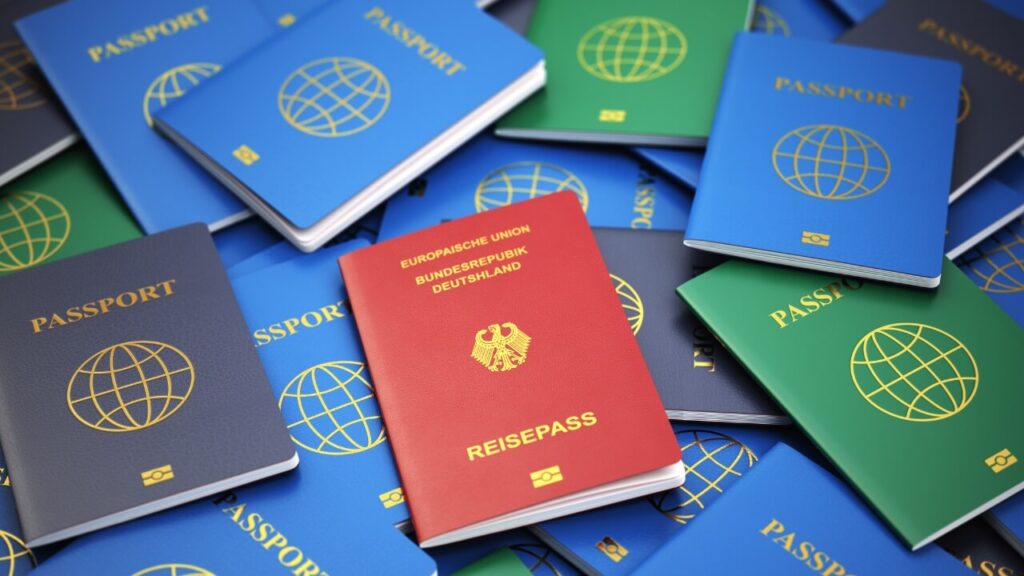
Well, in this guide, we’ll explore different ways to go to Germany, suiting various aspirations and situations.
Easy ways to go to Germany
There are lots of easy ways to go to Germany. But you need to know it before trying to get a visa for Germany. From our research, we have found these easy ways to go to Germany:
- Tourist visa (Schengen Visa)
- Student visa
- Work visa
- Business visa
- Job seekers visa
- Family reunion visa
- EU Blue Card
- Freelance visa
- Visa for medical treatment
- Guest scientist visa
- Au Pair visa
- Language course visa
- Blue Card for IT specialists
- Cultural/artist visa
- Investor visa
- Training/internship visa
- Asubildung or apprenticeship visa
- Job seeker visa for graduates (in Germany)
- FSJ (Freiwilliges Soziales Jahr) or voluntary work visa
- Visa for visiting family members of EU/EEA citizens
- Visa for fellowship
Now let’s check them one by one. Also, we will let you know the requirements of these visa types.
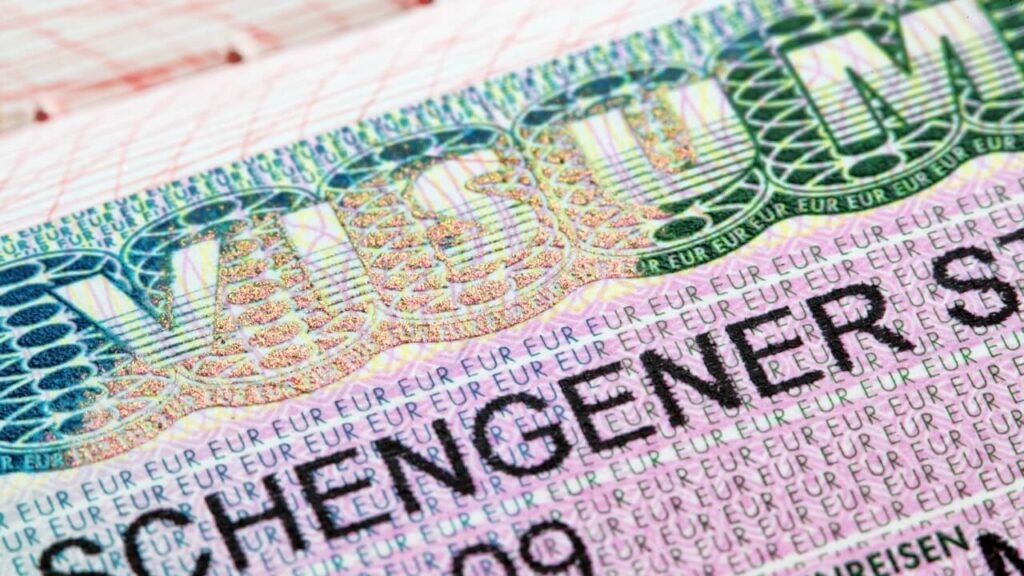
Tourist visa
Basically, one of the easiest ways to go to Germany as a tourist. If you’re planning a short visit to this awesome country for tourism, a Tourist Visa is required. It’s also known as a Schengen Visa.
Of course, you have to apply for this visa if you are not from the USA, UK, Canada, EU, Australia etc countries. Not only does this allow you to explore the country, but you can also visit friends or family and experience its rich culture. Remember to provide proof of accommodation, your travel plans, health insurance and financial means of support.
Likewise, a tourist visa is your passport to Germany’s wonders. Ensure you have your travel itinerary, proof of accommodation and travel health insurance ready for a seamless adventure.
Student visa
When it comes to Germany, a student visa is your golden ticket. Firstly, gain admission to a German university, ensure financial stability and secure health insurance for a rewarding academic journey. As I have noted, if your dream is to study in Germany, a student visa is the key.
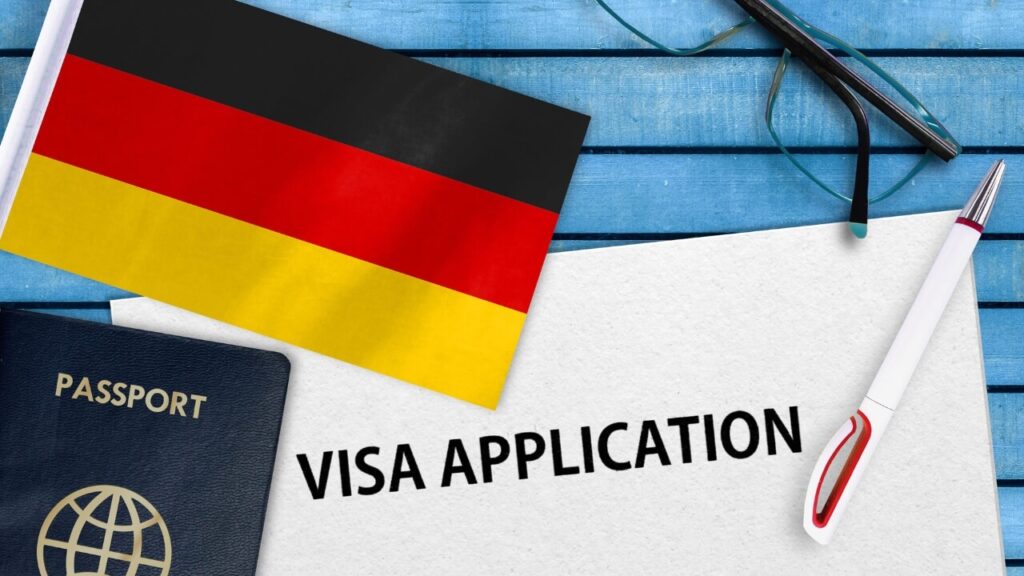
Therefore obtain admission to a German university, ensure you have financial means and secure health insurance. This visa opens doors to academic opportunities and a vibrant student life.
Business visa
For those traveling to Germany for business purposes such as meetings or conferences, a Business Visa is necessary. You’ll need an invitation letter from the German company, proof of financial means, and health insurance. It’s the gateway to conducting business and building international connections.
However, as with other types of visas, acquiring a business visa requires an invitation letter, financial documentation and travel health insurance. It’s the gateway to expanding your professional horizons in this economic powerhouse.
Work visa
Do you want to work in Germany? The Work Visa is your way. If you have a job offer and the right qualifications, you can use this pathway to bring your skills to Germany’s active workforce.
Job seekers visa
Concurrently, are you starting a job search in Germany? The job seeker visa lets you explore potential employment. Show your qualifications and begin a quest to find the perfect career fit.
Family reunification visa
Equally, reuniting with family in Germany? The Family Reunion Visa facilitates this heartfelt journey. Provide proof of your relationship and financial stability for a joyous family reunion.
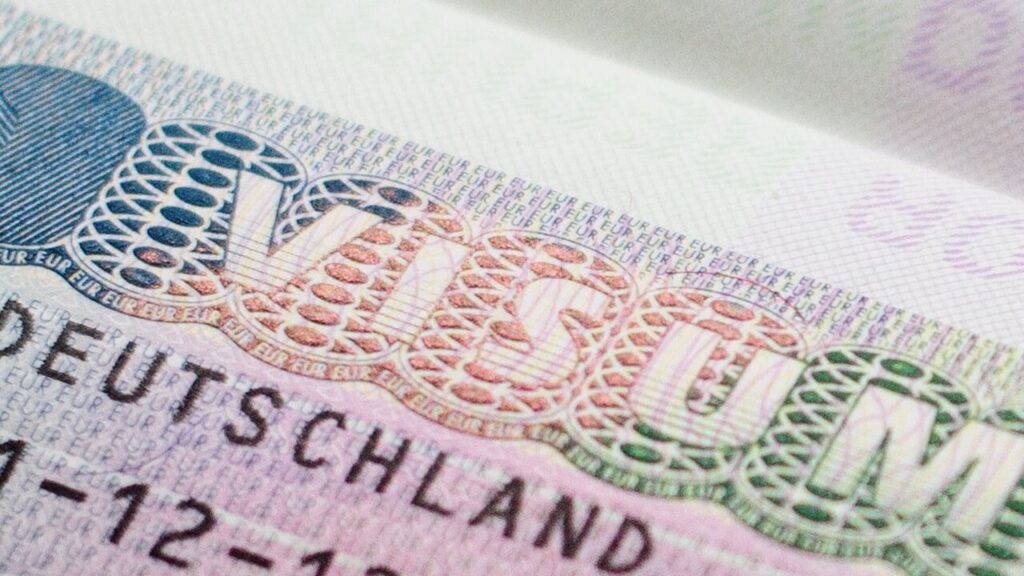
EU Blue Card
Additionally, if you are a highly skilled worker from outside the EU, you can pursue your career dreams with the EU Blue Card. If you have a job offer that meets specific criteria and a recognized degree, it opens doors to exciting professional opportunities.
Au Pair visa
Besides other types of visas, Au Pair could be a great option. Are you young and adventurous? Consequently, the Au Pair visa allows you to work with a host family, providing childcare and cultural exchange. It’s a unique opportunity to immerse yourself in German life.
Freelance visa
On the other hand, are you an entrepreneur or freelancer? The freelance visa in Germany is like your blank canvas. However, you need to make a detailed business plan, highlight your skills, and get ready for a self-employed adventure in Germany.
Visa for medical treatment
Another easy way to come to Germany for medical treatment. To seek medical treatment you can come to Germany. This specialized visa ensures you access to top-notch healthcare. Present your medical certificates, treatment confirmation, and proof of financial means.
Guest scientist visa
Invited to contribute to research projects? The Guest Scientist Visa welcomes researchers to Germany. An invitation from a German research institution, proof of qualifications, and financial means are essential to embark on a scientific collaboration.
Language course visa
Want to learn the German language? At this point, the language course visa supports your educational journey. However, to get that type of visa you have to secure an enrollment in a language school, arrange accommodation and ensure financial stability for a rewarding language learning experience in Germany.
Blue Card for IT specialists
On the other hand, there are lots of highly skilled IT specialists needed in Germany. That’s why, the Blue Card for IT Specialists could be a great option. A job offer meeting specific salary criteria, a recognized degree, and a passion for the IT field create a pathway to a dynamic career.
Cultural/artist visa
Certainly, artists and cultural workers seeking opportunities in Germany. They can obtain a cultural/artist Visa. However, an invitation from a German cultural institution, proof of artistic activities, and financial stability pave the way for a vibrant cultural exchange.
Job seeker visa for graduates (in Germany)
Typically, graduates from German universities can extend their stay with a job-seeker visa. But you have to show your graduation certificate, health insurance and financial stability as you transition from academia to the professional landscape in Germany. It is known as a job-searching visa in Germany.
Generally, graduate students get an 18-month visa to search for a job in Germany after finishing their studies.
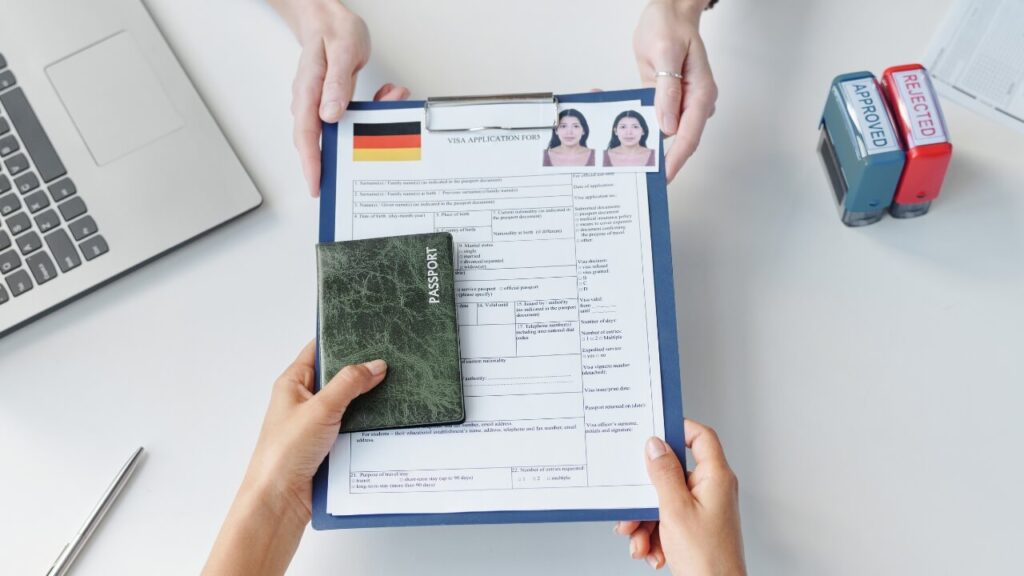
Training/Internship visa
For those aspiring to undergo vocational training or internships, the Training/Internship Visa is the gateway. It is also known as Ausbildung Visa. You need to show an Ausbildung contract, internship agreement and proof of accommodation for a hands-on learning experience in Germany.
Visa for visiting family members of EU/EEA citizens
If your family resides in Germany as EU/EEA citizens, the Visa for Visiting Family Members facilitates visits. Provide evidence of your relationship and the EU/EEA citizen’s residence to enjoy precious moments together in Germany.
Visa for fellowship
There are different kinds of fellowships in Germany. You need a short time visa to attend these types of fellowships. You need a visa for certain fellowships, even if the visa details are not explicitly mentioned in the embassies. The important topics that need to be addressed when applying for a visa to do a fellowship are still relevant.
Asubildung or apprenticeship visa
Ausbildung is a very popular term in Germany. If you are a non-EU national, you need to apply for a visa to start your Ausbildung in Germany.
Investor visa
Although there is not much information about this type of visa anywhere, there are special privileges for those who want to invest in Germany. To avail such privileges, you need to apply for an investor visa and talk to the relevant embassy in your home country
FSJ (Freiwilliges Soziales Jahr) or voluntary work visa
Freiwilliges Soziales Jahr or FSJ popularly known as voluntary work visa is a visa that allows you to come to Germany and work as a volunteer for up to one year. However, for this type of work, you can get a certain amount just to support your stay and food but it is not getting any salary.
Basic requirements visa for Germany (How to go to Germany)
In this section, you will learn the basic requirements for any type of visa for Germany. These are:
- Valid passport and photos: Ensure your passport is valid and have passport-sized photos ready
- Complete application form: Fill out the tourist visa application form accurately
- Travel health insurance: Obtain travel health insurance for the duration of your stay
- Proof of accommodation: Provide proof of your stay, such as hotel reservations or a letter of invitation
- Financial stability: Submit recent bank statements to demonstrate financial stability
- Travel itinerary: Include a detailed itinerary of your planned activities and destinations
- Flight reservations: Present confirmed flight reservations for the trip
- Consulate interview: Be prepared for a consulate interview if required
- Application submission: Submit your completed application along with all required documents
- Await approval: Patiently awaits approval for a hassle-free entry to explore Germany
How to go to Germany: what do you need?
Generally, for going to Germany, the easiest type of visa is often the Schengen tourist visa. This visa allows you to stay in Germany and other Schengen countries for up to 90 days within a 180-day period for tourism, business or family visits.
To apply, fill out the application form, provide proof of travel arrangements and accommodation, show travel insurance and prove your financial ability. The process is very straightforward for a short-term stay in Germany.
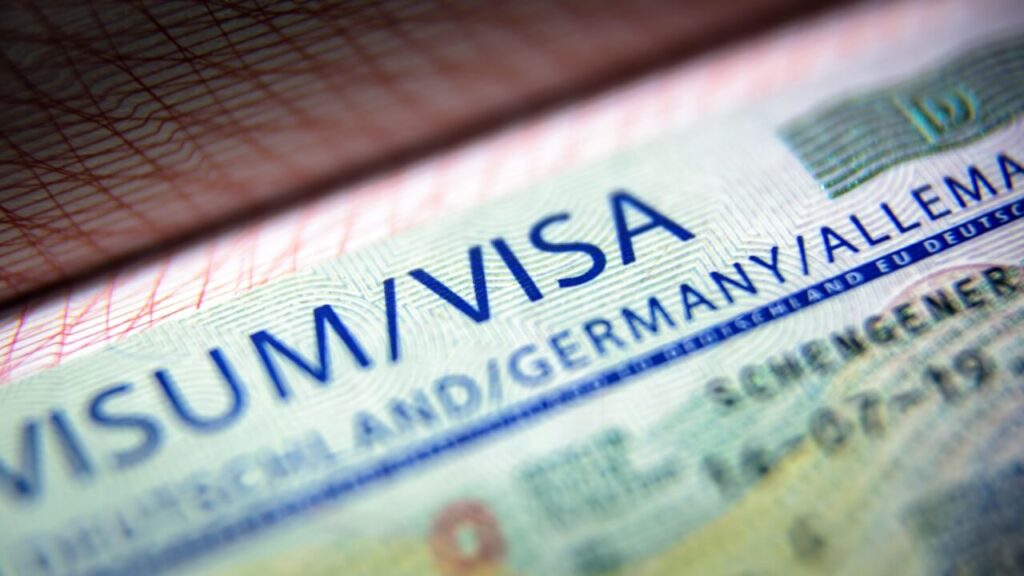
How to go to Germany: 3 tips
We believe these three tips could help you:
- Determine your purpose of visit: Firstly, choose whether you’re traveling for tourism, work, study or other reasons.
- Check visa requirements: Secondly, explore the visa requirements based on your nationality and the purpose of your visit.
- Set a budget: Finally, plan your budget considering accommodation, transportation, meals, and other expenses.
How to go to Germany: transportation options
- Find cheap flights: Explore different airlines, compare prices and choose the most convenient flight.
- Train travel: If you come from Europe or nearby you can try the country’s efficient and extensive train network for domestic travel.
- Bus services: Discover affordable bus options for traveling within Germany or from neighboring. countries.
FAQs: how to go to Germany
What are the requirements to go to Germany?
To travel to Germany, there are several essential requirements to keep in mind. Firstly, check if a visa is necessary based on your nationality. Since some countries have visa exemptions for short stays.
Secondly, you need to have a valid passport at the same time. Additionally, travel health insurance is mandatory. It will cover any unexpected medical expenses.
If you plan to stay longer, you have to apply for a D-visa or National Visa. For that, you will a residence permit after reaching Germany.
Are there easy ways to come to Germany without a lot of paperwork?
Yes, for short visits, a Tourist Visa might require less documentation. However, it’s essential to check specific requirements.
How can I go to Germany as a tourist?
Traveling to Germany as a tourist you need a tourist visa. To get that you need to follow several steps. Firstly, ensure your passport is valid for at least three months beyond your planned departure date.
Check if you need a visa based on your nationality. Because some countries have visa exemptions for short stays. Secondly, book your accommodation and have proof of it, along with a return ticket.
Health insurance is necessary, covering potential medical expenses. Finally, enjoy your trip to Germany and its rich cultural experiences!
Final thoughts about how to go to Germany
In conclusion, we would like to say, after reading this post, you should know now all the ways to come to Germany. However, embarking on a journey to Germany involves navigating various visa options tailored to different purposes.
Whether it’s for work, study, family reunification or exploration, Germany offers a diverse range of visa types. However, understanding the requirements and following the application process is important. In this way, you can pave the way to a successful German adventure.
So, whether you’re pursuing academic excellence, pursuing career opportunities or embracing a new chapter with loved ones, Germany’s visa options provide accessible avenues for diverse aspirations.
Safe travels to Germany!

Russia work permit
Oh,good but l’m applied before this help me pls
Ok
How go to German Ausbuildin visa